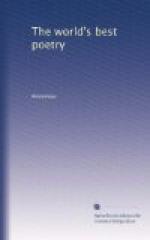“But think—O Mr. Soldier,
think,—
How many little sisters’
brothers
Are going all away to fight
And may be killed,
as well as others!”
“Why, bless thee, child,”
the Sergeant said,
His brawny hand her curls
caressing,
“’Tis left for little ones
like thee
To find that War’s not
all a blessing.”
And “Bless thee!” once again
he cried;
Then cleared his throat and
looked indignant,
And marched away with wrinkled brow
To stop the struggling tear
benignaut.
And still the ringing shouts went up
From doorway, thatch, and
fields of tillage;
The pall behind the standard seen
By one alone of all the village.
The oak and cedar bend and writhe
When roars the wind through
gap and braken;
But ’tis the tenderest reed of all
That trembles first when Earth
is shaken.
ROBERT HENRY NEWELL.
* * * * *
WATERLOO.
[June 15, 1815.]
FROM “CHILDE HAROLD,” CANTO III.
There was a sound of revelry
by night,
And Belgium’s capital
had gathered then
Her beauty and her chivalry,
and bright
The lamps shone o’er
fair women and brave men;
A thousand hearts beat happily;
and when
Music arose with its voluptuous
swell,
Soft eyes looked love to eyes
which spake again,
And all went merry as a marriage-bell;
But hush! hark! a deep sound strikes like
a rising knell!
Did ye not hear it?—No;
’twas but the wind,
Or the car rattling o’er
the stony street;
On with the dance! let joy
be unconfined!
No sleep till morn, when Youth
and Pleasure meet
To chase the glowing Hours
with flying feet,—
But hark!—that
heavy sound breaks in once more,
As if the clouds its echo
would repeat;
And nearer, clearer, deadlier
than before!
Arm! arm! it is—it is—the
cannon’s opening roar!
Within a windowed niche of
that high hall
Sate Brunswick’s fated
chieftain; he did hear
That sound the first amidst
the festival,
And caught its tone with Death’s
prophetic ear;
And when they smiled because
he deemed it near,
His heart more truly knew
that peal too well
Which stretched his father
on a bloody bier,
And roused the vengeance blood
alone could quell:
He rushed into the field, and, foremost
fighting, fell.
Ah! then and there was hurrying
to and fro,
And gathering tears, and tremblings
of distress,
And cheeks all pale which
but an hour ago
Blushed at the praise of their
own loveliness;
And there were sudden partings,
such as press
The life from out young hearts,
and choking sighs
Which ne’er might be
repeated: who would guess
If evermore should meet those
mutual eyes
Since upon night so sweet such awful morn
could rise!




